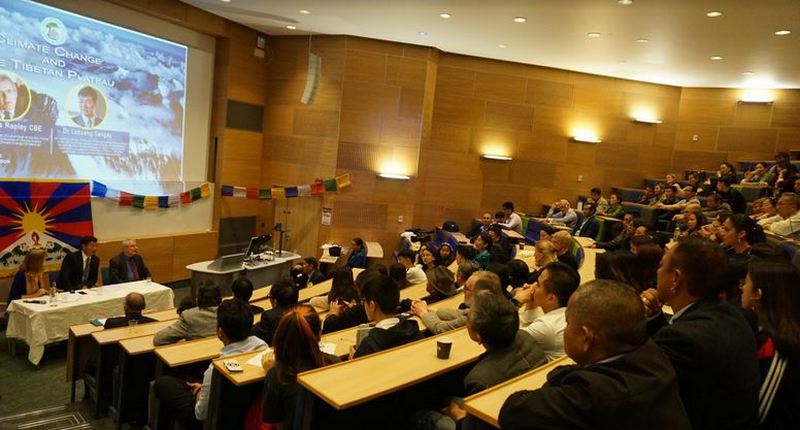London — Tibetan President Dr Lobsang Sangay joined popular scientist Professor Chris Rapley CBE, Professor of Climate Science at UCL, for a panel discussion on Climate Change and Tibet at University College London’s Darwin Lecture Theatre on June 21, 2019.
In a panel discussion chaired and moderated by renowned British Journalist Emily Buchanan, CTA President Dr. Lobsang Sangay and popular scientist Professor Chris Rapley CBE, Professor of Climate Science at UCL discussed Climate change and Tibet at University College London’s Darwin Lecture Theatre.
'Climate Change is becoming a threat to the existence of humanity itself but there is still a long way to go for world leaders to come up with a unanimous decision to combat it. In a recently published study in Science Advances by Joshua Maurer at Columbia University's Lamont-Doherty Earth Observatory notes that Hotter temperatures have melted as much as a quarter of Himalayan glacial ice in the past 40 years, revealed a study of declassified spy satellite photos from the 1970s.
'The new study is both hugely significant and worrying, given the vast number of people who rely on the glacier meltwater for hydropower and irrigation in Asia,' said Duncan Quincey, a glaciologist at the University of Leeds in the United Kingdom who works in the Himalaya.
President Dr Sangay began the discussion with his remarks about the strategic importance of the Tibetan plateau as the largest repository of fresh water outside North and South Poles: a water tower of Asia with 1.4 billion people in downstream countries like India, Pakistan, Bangladesh and Myanmar depending on Tibet’s waters.
He slso highlighted that it is increasingly recognized that Tibet’s climate and land use policies should not be treated solely as ‘internal affairs’ of the Chinese government, as the Tibetan plateau influences climate and atmospheric changes not only in Asia but also as far away as East Africa and even Europe. He expressed alarm at the latest BBC report of 19th June which found that the melting of the Himalayan glaciers has doubled over the last 40 years.
Professor Chris Rapley made the argument, using powerful and illustrative slides, that the earth was warming fast and that ‘we have upset the energy balance of this planet.’ Calling for absolute targets such as Abolish Fossil Fuels, he urged that climate change is happening now and happening to all of us; and that each one has an important role to play. He underlined the importance of preserving and protecting the Tibetan plateaus recognizing its role in maintaining the temperature of this planet.
Besides being the professor of Climate Science at UCL, Professor Rapley CBE is a Fellow of St Edmund's College Cambridge, a member of the Academia Europaea, a Distinguished Visiting Scientist at NASA’s Jet Propulsion Laboratory, and Chairman of the London Climate Change Partnership.
Before the climate change panel discussion, the President was invited to a ‘Meet and Greet’ with the Tibetan sponsors of Tibetan Refugee Charitable Trust, the charity wing of the Tibetan Community in Britain. The President thanked the Tibetan sponsors for providing education sponsorship, through the TRCT, to the Tibetan students in exile in India; and held out this initiative as an example worth emulating by the Tibetan Associations elsewhere in the US & Europe.
On Saturday, June 22nd, President Dr Sangay met with the Tibetan Community in Britain and addressed them.


![Tibet has a rich history as a sovereign nation until the 1950s when it was invaded by China. [Photo: File]](/images/stories/Pics-2024/March/Tibet-Nation-1940s.jpg#joomlaImage://local-images/stories/Pics-2024/March/Tibet-Nation-1940s.jpg?width=1489&height=878)


















